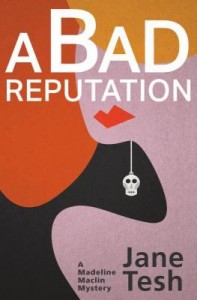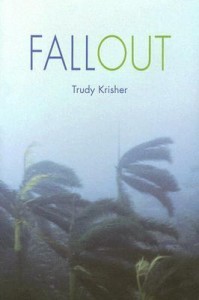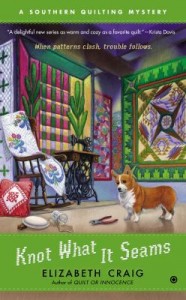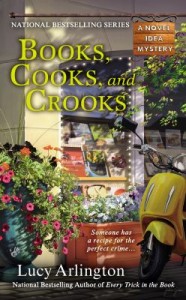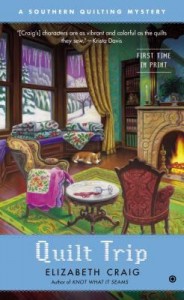 As usual, Beatrice Coleman has a bad feeling about Meadow Downey’s latest scheme. Meadow has caught wind of the old and rich Muriel Starnes’s get-together to determine an executor for her quilting foundation. The fact that Muriel didn’t invite Meadow to her party is of very little importance to Meadow, who is busy cooking up plans for the foundation. She’s convinced that Muriel should choose the Village Quilters. Beatrice, a recently retired art curator with a keen sense of etiquette, has waning patience for Meadow’s cockamamie ideas. Somehow though, Beatrice finds herself riding shotgun to Meadow, who speeds away from Dappled Hills and up a treacherous mountain in pursuit of quilting glory. Unfortunately for Meadow and Beatrice, the weather is looking awful gloomy…
As usual, Beatrice Coleman has a bad feeling about Meadow Downey’s latest scheme. Meadow has caught wind of the old and rich Muriel Starnes’s get-together to determine an executor for her quilting foundation. The fact that Muriel didn’t invite Meadow to her party is of very little importance to Meadow, who is busy cooking up plans for the foundation. She’s convinced that Muriel should choose the Village Quilters. Beatrice, a recently retired art curator with a keen sense of etiquette, has waning patience for Meadow’s cockamamie ideas. Somehow though, Beatrice finds herself riding shotgun to Meadow, who speeds away from Dappled Hills and up a treacherous mountain in pursuit of quilting glory. Unfortunately for Meadow and Beatrice, the weather is looking awful gloomy…
Even as they approach the mountain-top Victorian “Southern Gothic” mansion, sleet is falling and the sky is gray. Beatrice and Meadow are greeted with a chilly reception, though at the very least sweet Posy Beck and batty Miss Sissy, fellow Village Quilters members, have also crashed the party (at Meadow’s request). Muriel allows the party-crashers to stay, but not without a few subtle jibes at their expense. The atmosphere of party is noticeably lackluster. The house is cold and unwelcoming, and the real guests are gathered in the library in silence. Just as Muriel alludes to another reason for asking her guests here today, separate from the foundation, the power goes out.
Apparently, the build-up of ice on the power lines caused the outage. However, the outage is the least of everyone’s worries: the sleet also severed a large limb from a giant tree, blocking the driveway and Beatrice’s hope of a quick exit. Stranded, without power, a phone line, or even cell phone reception, it looks as if the party is turning into a sleepover. Once the outage has been identified and the hubbub dies down somewhat, Muriel reveals her big secret.
She’s been diagnosed with cancer and has only a few weeks left. She used the foundation as an excuse to gather friends and family to apologize for any past transgressions. Alexandra, her estranged daughter, Holly, a librarian and fellow quilter, Dot, another fellow quilter, and Winnie, her former friend are the formally gathered guests, along with Muriel’s lawyer, Colton. Beatrice and the rest of the Village Quilters soon learn that Muriel’s unkindness has created rifts in almost all of her relationships. Muriel’s company is shocked when she delivers a blanket apology to the entire room. Beatrice observes that Muriel’s apology seems legitimate in its sincerity, yet rehearsed, regrettably. Nobody in the room appears to lap it up with much enthusiasm. Perhaps Muriel has stepped on the toes of her friends and family one too many times. Following the surprise announcement, each guest makes a case for her guild and the foundation, and then Muriel bids them good night.
Muriel’s apology was well-timed, because she doesn’t live to see the next morning. Despite her old age and admission of cancer, Beatrice is sure that foul play is afoot. From the look of Muriel’s body, Beatrice recognizes what she is sure are signs of suffocation. At Meadow’s insistence, she plays detective, questioning each one of the guests. But how just how safe is Beatrice in the role of detective, blatantly trying to sniff out the killer? Just how safe are any of the guests, trapped in an isolated mansion with a killer lurking in plain sight?
Quilt Trip is the third novel in Elizabeth Craig’s A Southern Quilting Mystery series. Craig’s latest novel is slightly different in structure. Quilt Trip is set in a much more condensed time frame of a few days and almost entirely in a single setting, which heightens the urgency and mystery, but the novel has the same charm as Quilt or Innocence and Knot What It Seems thanks to well-crafted, quirky characters. There isn’t considerable development in the slowly unfolding relationship between Beatrice and Wyatt, the amiable Dappled Hills minister, though Craig does include a little bit of interaction between the two. If you’d like to start at the beginning of the series, take a look at past posts here and here.
Check this title’s availability in the UNC-Chapel Hill Library catalog.
 Luke Fletcher is a Marine serving in Afghanistan when he receives a call from Kate Nolan, a small-town lawyer. The call is to inform Luke that an ex-girlfriend from high school, Dawn Simpson, has died. Dawn left behind a ten-year old daughter, Taylor. Luke has been named as Taylor’s father and also her guardian in case something happens to Dawn. Luke must return home to Dare Island on North Carolina’s Outer Banks to take on this new responsibility. In his quest to do what’s right, Luke finds himself falling for both his little girl and the intelligent but damaged Kate, who is a former military brat herself and doubts the ability of a Marine to make a good father.
Luke Fletcher is a Marine serving in Afghanistan when he receives a call from Kate Nolan, a small-town lawyer. The call is to inform Luke that an ex-girlfriend from high school, Dawn Simpson, has died. Dawn left behind a ten-year old daughter, Taylor. Luke has been named as Taylor’s father and also her guardian in case something happens to Dawn. Luke must return home to Dare Island on North Carolina’s Outer Banks to take on this new responsibility. In his quest to do what’s right, Luke finds himself falling for both his little girl and the intelligent but damaged Kate, who is a former military brat herself and doubts the ability of a Marine to make a good father.
